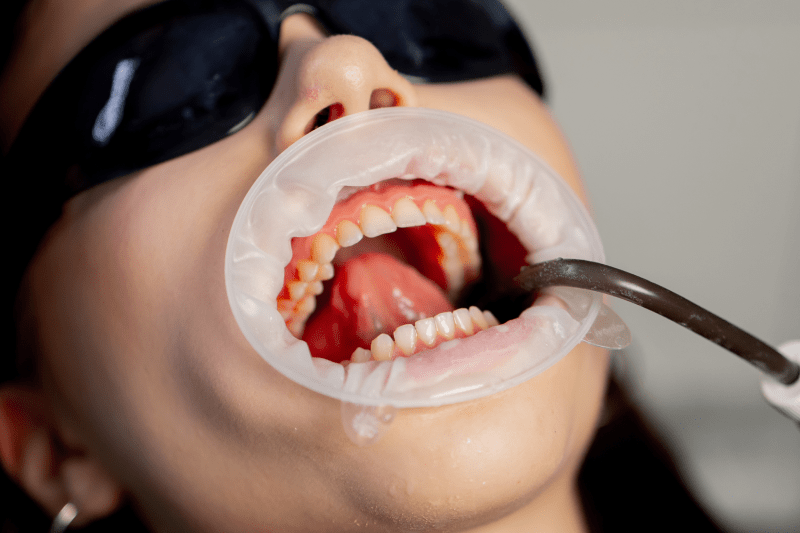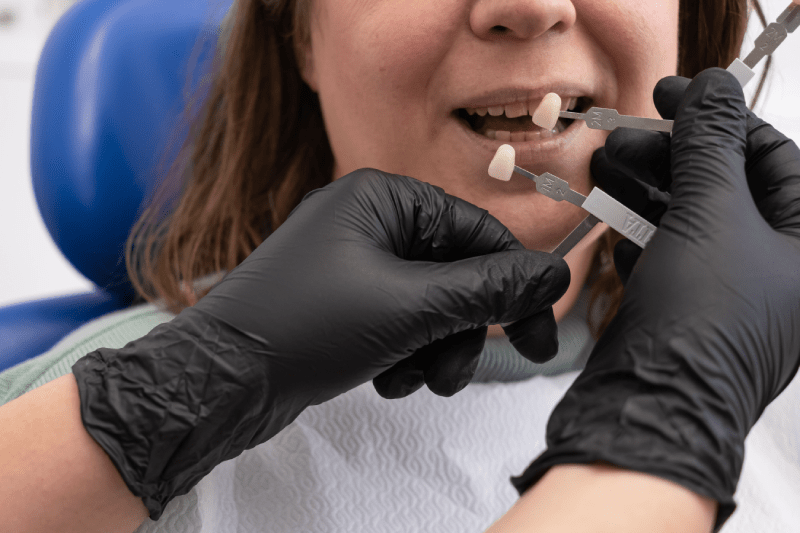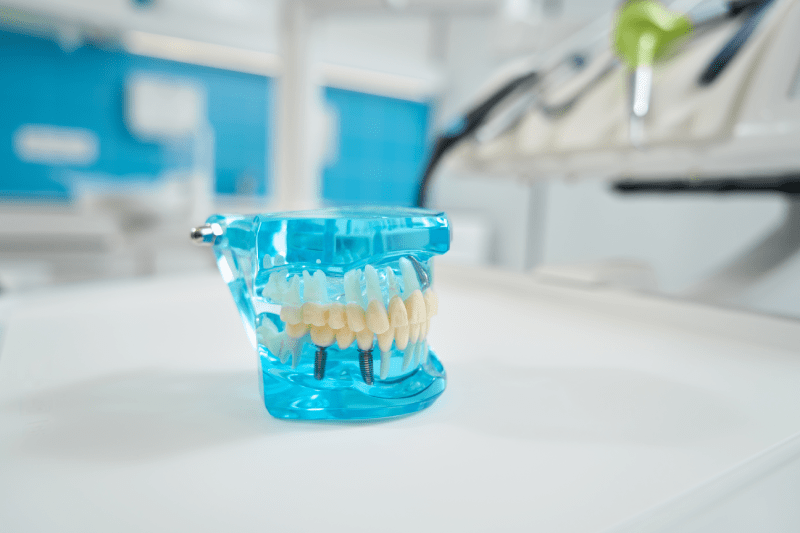What is a Dental Veneer and What Kind of Treatment Method is it?
A dental veneer is a thin layer, usually made of porcelain or composite material, that is bonded to the front surface of a tooth. This treatment method is applied for cosmetic purposes to improve the color, shape, size, and position of the teeth. It is an ideal solution for problems such as permanent discoloration, slight misalignment, gaps, or small cracks.
Before the veneer procedure begins, a very small amount of the tooth’s surface is removed, or in some cases, no removal is done at all. Then, the custom-made veneers are bonded to the tooth with a special adhesive. This treatment can make a huge aesthetic and psychological difference by fundamentally changing the patient’s smile in a short period. A dental veneer provides a stronger and more aesthetic result while preserving the natural structure of the tooth.
Is Dental Veneer Treatment Really Painful?
Dental veneer treatment is generally a painless procedure. During the procedure, your dentist will apply a local anesthetic to eliminate the sensitivity of your teeth. This way, you will not feel any pain while a very small amount of the front surface of the teeth is filed down or while the veneers are being bonded to the tooth.
When the effect of the anesthetic wears off, there may be a slight sensitivity or throbbing, but this condition usually goes away on its own within a few days. Most patients can easily control this slight discomfort with over-the-counter painkillers. If your pain threshold is low or you are anxious, you can talk to your dentist and ask them to take extra precautions. Cure Holiday experts will answer all your questions and make this process comfortable for you.
Are Dental Veneers Permanent?
Dental veneers are considered a permanent solution, but they are not guaranteed for life. The lifespan of a dental veneer varies depending on the quality of the material used, the patient’s oral hygiene, habits like teeth grinding, and regular dental check-ups. Porcelain veneers, with good care, can last 10 to 15 years or longer. Composite veneers, on the other hand, usually last for about 5 to 7 years and may require more frequent replacement. Veneers can change color, wear down, or develop small cracks over time. Therefore, regular maintenance and check-ups are of vital importance to extend the life of the veneers.
How Long Does the Dental Veneer Procedure Take?
The dental veneer procedure is usually completed in 2 or 3 sessions. In the first appointment, your dentist will perform an intraoral examination, listen to your expectations, and create a treatment plan. In the second appointment, a minimal amount of the front surface of the teeth is filed down, impressions are taken, and these impressions are sent to the laboratory.
During this process, temporary veneers are placed to ensure aesthetic and functional continuity. In the final appointment, the permanent veneers prepared in the laboratory are bonded to the teeth, and final checks are made. This entire process, from the preparation stage to the finish, usually takes one or two weeks. This speed and efficiency are a great advantage, especially for patients coming from abroad.
In Which Cases Should Dental Veneers Be Applied?
Dental veneers are an ideal solution if you have various problems that spoil the aesthetic appearance of your teeth. If you have permanent discolorations on your teeth and whitening procedures don’t work, if you have small cracks, chips, or abrasions on your teeth, if there are gaps (diastema) between your teeth, if your teeth are slightly misaligned, or if you are dissatisfied with the shape and size of your teeth, you can consider getting dental veneers. Your dentist will make a comprehensive evaluation to decide if dental veneers are the most suitable treatment method for you.

Is Everyone a Suitable Candidate for Dental Veneers?
Whether you are a suitable candidate for dental veneer treatment is determined by a detailed examination by your dentist. In general, you need to have healthy teeth and gums. If you have habits like teeth grinding (bruxism) or gum disease, these problems may need to be treated first. If your teeth are very weak or severely damaged, a more comprehensive treatment like a crown may be recommended instead of a veneer. Also, this treatment is generally not recommended for individuals under the age of 18 as tooth and jaw development is still ongoing.
Do Dental Veneers Harm the Teeth?
When applied correctly, dental veneers do not harm the teeth; on the contrary, they protect and strengthen them. A very small amount of the enamel tissue is removed from the surface of the tooth for the veneer, and this process does not affect the overall health of the tooth. The veneer helps to protect the front surface of the tooth from external factors (wear, discoloration). However, insufficient hygiene or improper application can lead to tooth decay or gum problems under the veneer. Therefore, having the treatment done by an experienced dentist and paying attention to regular oral hygiene is of vital importance.
Is Anesthesia Used During the Dental Veneer Procedure?
Yes, local anesthesia is generally used during the dental veneer procedure. Your dentist will numb the area where the tooth will be prepared to prevent you from feeling any pain or sensitivity. Anesthesia is used in this process, especially when the enamel layer of your tooth is being filed down, to increase the patient’s comfort. If only one or two teeth are to be treated, the amount of anesthesia is kept minimal. In some cases, no anesthesia may be needed at all. The effect of the anesthetic wears off within a few hours after the procedure, and you may feel a slight numbness during this time.
Is There Sensitivity After Dental Veneer Treatment?
It is normal to experience a slight sensitivity after dental veneer treatment. This sensitivity is usually to cold or hot food and drinks. This can occur because a part of the tooth’s enamel layer has been filed down. The sensitivity usually decreases and disappears on its own within a few days. If your sensitivity is severe or lasts for more than a few weeks, you should contact your dentist. This condition may indicate a problem with the fit of the veneer or a problem underneath it.
What Can Be Done to Extend the Life of Dental Veneers?
To extend the life of your dental veneers, you need to follow a careful oral hygiene routine. You should brush your teeth at least twice a day, use dental floss, and complete your cleaning with mouthwash. It is important to avoid hard foods (like nuts, ice) and sticky foods that can damage your veneers. If you have habits like nail-biting or pen-chewing, you should give them up. If you have a teeth grinding problem, using a night guard recommended by your dentist is of vital importance for the protection of the veneers. Also, you should not skip regular dental check-ups.
What Are Dental Veneer Materials?
The most common materials used for dental veneers are porcelain and composite resin. Porcelain veneers are the most popular option due to their durability, stain resistance, and natural appearance. The light-reflecting property of porcelain adds a natural and aesthetic shine to your teeth. Composite veneers, on the other hand, are a more affordable alternative that can be applied directly to the tooth in a color that matches the tooth. Composites are less durable than porcelain and can change color over time, so they may require more frequent replacement. The material choice is determined by your aesthetic expectations, budget, and your dentist’s recommendations.
What is the Difference Between Porcelain and Composite Dental Veneers?
The most important differences between porcelain and composite dental veneers are durability, aesthetics, and cost. Porcelain veneers are specially prepared in the laboratory, are very resistant to staining, and have a long lifespan of 10-15 years. They give the closest results to the appearance of a natural tooth. Composite veneers, on the other hand, can be applied by the dentist in a single session, are a faster solution, and are more affordable. However, composites are not as durable as porcelain, can change color over time, and may need to be replaced after 5-7 years. Which material is more suitable for you should be determined by the condition of your teeth, your budget, and your aesthetic expectations.
Can Dental Veneers Be Done Together With Teeth Whitening?
Yes, dental veneer treatment can be done together with a teeth whitening procedure, and it is often recommended. If you are only getting veneers on a few of your teeth, the color of the rest of your teeth will determine the color of the veneers. Therefore, choosing the veneer color after you have brought the color of your existing teeth to the desired shade with a whitening procedure will give you a more aesthetic and holistic result. However, the teeth whitening procedure does not change the color of the veneers. Therefore, a whitening procedure done after the veneers are placed will only affect your other natural teeth.
How Do Teeth Look After Dental Veneer Application?
Immediately after the dental veneer application, your teeth will have a brighter, whiter, and more uniform appearance. Since the veneers are specially designed to match the shape and color of your natural teeth, there is no artificial look. The size and shape of your teeth will be in perfect harmony with your smile and facial features. In addition, dental veneers provide a smooth surface free of stains, so your teeth will always look clean and well-cared for. You may have a slight feeling of fullness at first, but you will get used to this feeling in a very short time.
Do Dental Veneers Cause Tooth Decay?
The dental veneers themselves do not decay, but the tooth tissue under or at the edges of the veneer can decay. This happens when plaque and bacteria accumulate at the edges of the veneer due to insufficient oral hygiene. Therefore, the care of dental veneers is very important to prevent tooth decay. Regular and proper brushing, flossing, and dental check-ups are of critical importance to protect the health of the tooth under your veneer. If decay occurs under your veneer, the veneer must be removed, and the decay must be treated.

What Should Be Done If a Dental Veneer Cracks or Breaks?
Although dental veneers are durable, they can crack or break when exposed to an extremely hard impact or strong chewing pressure. If you notice a crack or a break in your veneer, you should immediately contact your dentist. While small cracks can sometimes be repaired, large breaks usually require the veneer to be completely replaced. Continuing to use a cracked veneer can damage the remaining tooth tissue and lead to oral health problems. Therefore, getting professional help is the most correct approach.
How is Oral Care Done After Dental Veneer Treatment?
Your oral care routine after dental veneer treatment is not different from that of your natural teeth. You should brush your teeth at least twice a day with a soft-bristled toothbrush and fluoride toothpaste. It is important to carefully clean the areas where the veneers meet the gums to protect gum health. You can use regular dental floss. In addition, rinsing your mouth with an alcohol-free mouthwash will complete the hygiene. Your dentist will make special care recommendations to help you make your veneers last longer.
Are All Teeth Filed Down When Placing Dental Veneers?
No, not all teeth are filed down when placing dental veneers. Generally, only a very small amount of enamel tissue is removed from the front surface of the tooth, just enough for the veneer to fit. This process ensures that the veneer integrates with the tooth and gives a natural look. The amount of filing varies according to the current condition of the tooth and the type of veneer. Your dentist tries to keep this filing process at a minimal level to best preserve the natural structure of your tooth. The filing is painless as it is done under local anesthesia.
Do Dental Veneers Cause Gum Problems?
When done correctly and cared for properly, dental veneers do not cause gum problems. However, if the edges of the veneer are too far from or too close to the gum line, food particles and plaque can accumulate. This can lead to gum inflammation and other gum diseases. For the dental veneer to protect gum health, the veneer must have a perfect fit with the gums and have smooth edges. Regular dental check-ups are important for the early detection of such problems.
How Long Does the Whiteness Last with Dental Veneers?
Dental veneers, especially porcelain veneers, are extremely resistant to staining. While staining foods like coffee, tea, and red wine and smoking can stain your natural teeth, the color of your veneers remains constant. This can cause a color difference between your teeth. Porcelain veneers are less prone to staining than composite veneers. Therefore, you can maintain the whiteness of your veneers for many years with regular and proper oral hygiene.
Which Teeth Are Given Priority in Dental Veneer Treatment?
In dental veneer treatment, priority is usually given to the front teeth, which are the most aesthetically prominent. The front incisors in the upper and lower jaws are the teeth that play the most role in smile aesthetics. However, in some cases, molar teeth can also be veneered, especially when it is necessary to improve chewing function or general aesthetics. The decision of which teeth to veneer is made by considering the patient’s aesthetic expectations and the dentist’s clinical evaluation. The treatment plan is personalized to ensure that the patient’s smile design goals are achieved.
Which Materials Are the Best for Dental Veneer Treatment?
The best material for a dental veneer varies according to the patient’s needs, budget, and expectations. Porcelain veneers offer the highest level of performance in terms of aesthetics, durability, and stain resistance. Especially advanced technology porcelains like E-max provide the closest look to natural teeth. Zirconium veneers are known for their durability and biocompatibility, but they may not have as much light translucency as porcelain. Composite veneers, on the other hand, offer a fast and economical solution. Your dentist will evaluate all these factors to determine the most suitable material for you.
What Affects the Cost of Dental Veneers?
The cost of dental veneers varies depending on many factors. These include the type of material used (porcelain, zirconium, composite), the number of veneers to be made, the need for additional treatments (such as teeth whitening, gum treatment), and the dentist’s experience. Also, the location of the clinic and the quality of the service it provides are important factors that affect the prices. The cost of dental veneers in Turkey is more economical than in many other countries. For transparent pricing, you can contact Cure Holiday.
What Are the Advantages of Dental Veneer Treatment?
Dental veneer treatment has many advantages. Most importantly, it improves your smile by giving your teeth a natural and aesthetic look. The treatment process is quite fast and can be completed in a few sessions. Veneers are resistant to stains, which allows them to stay white for a long time. At the same time, they fix small imperfections (misshapen teeth, cracks) and protect the teeth from external factors. This treatment increases the self-confidence of patients and allows them to be more comfortable in their social and professional lives.
What Are the Disadvantages of Dental Veneer Treatment?
Dental veneer treatment also has a few disadvantages. The most important disadvantage is that it is an irreversible procedure because the tooth is filed down. When veneers break or get damaged, new veneers need to be made. In addition, composite veneers can change color over time and may need to be replaced. Porcelain veneers, on the other hand, are more expensive than composites. The risk of veneers breaking is higher in people with a teeth grinding habit, so it is important for them to use a protective night guard.
Are There Restrictions on Eating and Drinking After Dental Veneers?
While you have temporary veneers, it is recommended to avoid hard, sticky, and coloring foods. After the permanent veneers are placed, these restrictions are largely eliminated. However, it is important to avoid excessive consumption of hard and sticky foods (like nuts, ice, caramel) to prevent damage to your veneers. Also, if you do not pay attention to oral hygiene, stains can form under the veneers. For a healthy smile, you need to continue to eat a healthy diet.
Is There an Age Limit for Dental Veneer Treatment?
Although there is no definite age limit for dental veneer treatment, it is generally suitable for individuals 18 years and older when tooth and jaw development is complete. Veneers made while tooth and jaw development is still ongoing can cause incompatibilities and problems in later years. For this reason, for aesthetic problems in young individuals, reversible methods like orthodontic treatment or bonding are preferred. Your dentist will determine the most suitable treatment time for you.
Do Dental Veneers Affect the Gums?
When placed correctly and cared for properly, dental veneers do not negatively affect the gums. If the veneer fits snugly to the gum and its edges are smooth, it prevents plaque accumulation and protects gum health. However, if the edge of the veneer presses on the gum or is rough as a result of an incorrect application, it can lead to gum inflammation and recession. Therefore, having the treatment done by an experienced dentist is of vital importance.
How Quickly is Dental Veneer Treatment Completed?
Dental veneer treatment is much faster than traditional braces or other orthodontic treatments. Usually, only a few appointments are sufficient, including the initial examination and planning, the preparation of the teeth, taking impressions, and finally, the placement of the veneers. The total treatment process can be completed in as little as one week, depending on the chosen material and the complexity of the case. This speed is a great advantage, especially for patients who have limited time or want to achieve aesthetic results quickly.
Why Are Temporary Dental Veneers Necessary?
Temporary dental veneers are used to protect your teeth and provide an aesthetic appearance while the permanent veneers are being prepared in the laboratory. Since your teeth are filed down, they become more vulnerable to hot and cold sensitivity. Temporary veneers prevent this sensitivity and protect your teeth from external factors. In addition, they prevent your smile from looking empty and incomplete, providing aesthetic continuity. Temporary veneers allow you to continue your normal life until the day your permanent veneers are placed.

Will the Color of My Teeth Change After Dental Veneer Treatment?
Dental veneers, especially porcelain ones, are more durable and more resistant to staining than your natural teeth. However, your natural teeth that do not have veneers can stain and change color over time. This can cause a color difference between your veneers and your natural teeth. Therefore, having a teeth whitening procedure done before the treatment ensures that all your teeth are the same shade. Also, when choosing the color of the veneers, your dentist will take into account possible future color changes.
What Should Post-Dental Veneer Check-ups Be Like?
After dental veneer treatment, it is very important that you do not skip regular dental check-ups. Within the first few months, your dentist may call you for a check-up appointment to check the fit of the veneers with your gums and their general health. After that, it is recommended that you continue with routine dental check-ups every 6 months. These regular check-ups are of vital importance for early detection and prevention of possible problems, and for protecting the health of both your teeth and your veneers.
Does Smoking Affect Dental Veneers?
Smoking can cause staining, especially on composite veneers. Porcelain veneers are more resistant to stains caused by smoking, but your natural teeth around the veneers and your gums can be negatively affected. Smoking increases the risk of gum diseases, which can shorten the life of the veneers. If you want to have a healthy smile and extend the life of your veneers, quitting smoking would be the most correct decision.
Do Dental Veneers Cause Bad Breath?
Dental veneers themselves do not cause bad breath. However, if the edges of the veneer do not fit snugly, food particles and bacteria can accumulate in these spaces. This accumulation can lead to both tooth decay and bad breath. Therefore, it is important to have the treatment done by an experienced dentist and to ensure that the veneer is smooth and fits snugly. Also, you can prevent this risk with regular and proper oral hygiene.
What is the Difference Between Dental Veneer Treatment and Orthodontic Treatment?
Dental veneer treatment is a cosmetic solution used to correct the aesthetic appearance of teeth. It offers a quick way to correct the color, shape, and small gaps of the teeth. Orthodontic treatment (braces or clear aligners), on the other hand, aims to fix more serious alignment problems by correcting the position of the teeth and jaw structure. While veneer treatment is an irreversible procedure, orthodontic treatment preserves the natural structure of the teeth. Which treatment is more suitable for you depends on the condition of your teeth and your goals.
How to Get a Hollywood Smile with Dental Veneers?
A “Hollywood smile” is a comprehensive smile design that aims to achieve a perfect, symmetrical, and brilliant smile by completely changing the color, shape, and size of the teeth. This usually includes a full set of dental veneers (usually on the front teeth of the upper and lower jaws), gum shaping, and sometimes additional procedures such as teeth whitening. This personalized treatment is designed according to the patient’s facial features and aesthetic expectations. This treatment not only enhances your teeth but also boosts your self-confidence, allowing you to start a new chapter in your life. Cure Holiday experts can help you with a personalized Hollywood smile design.
How to Choose an Expert Dentist for Dental Veneers?
Dental veneer treatment is a sensitive procedure in terms of aesthetics and function. Therefore, it is very important to choose an experienced and expert dentist. When making a choice, you can look at the dentist’s previous case examples (before and after photos), question the quality of the materials they use, and examine the clinic’s hygiene standards. Health tourism agencies can make this process easier for you. Cure Holiday collaborates with expert dentists who work at international standards and can provide you with the best service.
Do Dental Veneers Affect Speech?
When placed correctly, dental veneers do not affect speech. In the first few days of the treatment, you may feel a slight change in speech as your tongue gets used to the new veneers, but this condition goes away in a very short time. Your tongue quickly adapts to the new tooth surface and shape. If the size or shape of the teeth is changed too much, this can cause temporary difficulties in pronunciation, but these problems usually disappear within a few days.
Is Getting Dental Veneers an Aesthetic or Functional Procedure?
Dental veneer treatment offers both an aesthetic and a functional solution. Aesthetically, it gives your teeth a beautiful smile by improving their color, shape, and alignment. Functionally, it repairs small cracks and abrasions on the teeth, protecting their chewing function and general health. It strengthens the structure of the teeth and provides protection against external factors. Therefore, a dental veneer is an ideal option for people who are looking for both an aesthetic appearance and want to improve their dental health.
When is a Check-up Appointment Required After Dental Veneer Application?
After dental veneer treatment is completed, your first check-up appointment is usually made one week later. In this appointment, your dentist checks the fit of the veneers with your gums, your bite, and your general comfort. After that, it is recommended that you continue with routine dental check-ups every 6 months. These regular check-ups are of vital importance for early detection and prevention of possible problems, and for protecting the health of both your teeth and your veneers.
Are Dental Veneers Covered by Insurance?
Whether dental veneers are covered by insurance depends on your insurance plan and policy. Since veneers are generally considered a cosmetic procedure, insurance companies may not cover all or part of this treatment. Before starting the treatment, it is important to contact your insurance company to get detailed information about the coverage. However, when you work with Cure Holiday, you can get the best price for the treatment even without insurance, thanks to the affordable packages.
How Do Dental Veneers Repair Cracks and Fractures?
Dental veneers restore the integrity of the teeth by covering up small cracks, fractures, or abrasions on the front surface of the teeth. The veneer completely covers the damaged tooth surface, protecting the tooth from external factors and giving it a stronger structure. This prevents the tooth from being damaged further. This procedure repairs both the aesthetic appearance and the functional strength of the tooth. However, when the veneer itself cracks or breaks, it usually cannot be repaired and needs to be replaced with a new one.
Can I Start a New Life with Dental Veneers?
For many people, dental veneer treatment means starting a new chapter in their lives. People who are hesitant to smile or avoid social interactions due to imperfections in their teeth become more confident thanks to this treatment. A new and aesthetic smile can have a positive effect on both social and professional life. Therefore, a dental veneer offers much more than just a physical change. Cure Holiday can help you start a new life by achieving your dream smile.



